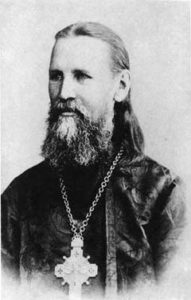SSCORRE!
Saint Sophia Cathedral
Online Resources for our Religious Edification

Topic of the Week:
Topic of the Week – On Difficulties in Christian Life: A Mountain Ahead. Hurray?
“As a rule, when running up against difficulties in our ordinary, daily life, we try to get around them however we can. This is perfectly natural—after all, if we, let’s say, are walking home and on our path is an icy hill, it would be more reasonable to take another route rather than risk slipping and breaking a limb…. This is probably the first thing to which it would make sense to pay attention: As Christians and simply as adults, responsible people, we should not create hardships for ourselves artificially. Our lives are hard enough without that.
Nevertheless, a person who categorically avoids whatever difficulties that may be rarely succeeds in life. He can graduate from school, university, find a relatively comfortable and easy job, but he will not attain any important thing that a different attitude towards life might attain. After all, only truly difficult situations, moreover, stressful situations force us to mobilize all our strength, and stimulate us to learn how to “outgrow” them. Therefore, while avoiding difficulties where it is rational to do so, we must under no circumstances hide from them where they might be able to teach us something essential. This applies to study, work, sports, and of course to Christian life….”Excerpted from On Difficulties in Christian Life
Adult/Family
“…Why must we definitely struggle with difficulties in Christian life? Because, as St. John Climacus formulates it, when we are warred against we fight back; that is, when we run up against an inner struggle, when we have to do something with psychological difficulty, with effort, we understand that our passions are behind this along with our direct enemy [the devil], who does not sleep. And this understanding arouses us to overcome fear and laziness, and do the very thing that is salvific for us.
And what in Christian life is especially hard for us? Deeds and acts directed against the passion that is acting most forcefully at that moment in us. It is even somehow strange at times to see how one thing is hard for one person, another thing for another, a third for a third; and each of them would gladly do what is hard for the others. This is not so much because these people are so very different as it is because different passions act in them to different degrees.
What does it mean to “overcome difficulties”? It practically always means growing out of our faintheartedness. And of course when we are already adults this becomes more and more difficult if we have not been accustomed to it from childhood….Perhaps each of us needs to try to learn to accept every difficulty as a lesson. What is needed for this?…”
Continue reading the entire article On Difficulties in Christian Life
Preschool:
“Without winter there would be no spring, and without spring there would be no summer. So it is also in the spiritual life: a little consolation, and then a little grief—and thus little by little we work out our salvation.“
– St. Anatoly Zertsalov, taken from The Optina Elders and their Sayings
Sometimes winter is harsh with too much cold and snow but this time is when the plants rest. Sometimes spring is harsh with heavy rains that flood, but the plants need the rain which makes them grow. Sometimes summer is harsh with heat that is too hot, but the plants need the sun to grow and that is how we get our food to eat. Our life in Christ is like that; sometimes we experience things that are difficult for us, but they make us grow stronger and closer to Christ and God.
Elementary School:
“A continuously happy life produces extremely unhappy consequences. In nature we see that there are not always pleasant springs and fruitful summers, and sometimes autumn is rainy and winter cold and snowy, and there is flooding and wind and storms, and moreover the crops fail and there are famine, troubles, sicknesses and many other misfortunes. All of this is beneficial so that man might learn through prudence, patience and humility. For the most part, in times of plenty he forgets himself, but in times of various sorrows he becomes more attentive to his salvation.”
St. Ambrose of Optina on the Consequences of a Continuously Happy Life
Middle School:
“I once knew a priest who often signed his correspondence with, “Asking God’s choicest blessings on you, I remain…” When I would read this, I would imagine that God was looking into a Whitman’s Sampler of chocolates and selecting just the right one. (Please, let it be the orange cream!) I wondered if God had blessings that weren’t the “choicest” and what it would mean to be the recipient of the not so choice blessings, the kind that someone might take a bite out of, realize it was the nougat or some nasty jelly, and try and hide it back in the box.
Since there are blessings that don’t seem like blessings, especially at first, we might not always display a keenly developed sense of gratitude. I have particular difficulty giving thanks for moments of humiliation and sorrow, even though I have read the lives of numerous saints who were grateful, no matter what the trial.
I am thinking here in particular of St. Elizabeth the New Martyr, Grand Duchess of Russia, who sang hymns from within the mineshaft where she met her death. Accounts of this amazing behavior come to us from the very people who dumped her and those with her into the mineshaft. They were amazed. I am amazed. St. Elizabeth brought her ‘A’ game to the mineshaft that day. It was an impossible circumstance, and who would blame her for depression or anger or even hysteria?
What did it take to be able to bring her ‘A’ game to her death? Probably a lifetime of practice. A rich inner life and relationship with God from which to draw strength, to display dignity, to remain focused, to sing hymns. In order to draw on that relationship with God, Elizabeth needed to nurture her rich inner life. While all around her violence and chaos ensued, both political and personal, she chose not to discard the faith she had carefully developed, even in the face of certain death. It’s a tall order. Certainly requiring her ‘A’ game. We sometimes wonder what all the rigmarole is about. Why the fasting? Really, a hamburger just tastes so good, especially on Friday. What about all those services and checks on certain behaviors? And what’s the big deal about Sunday anyway? What do WE get out of all this? Until tested, it is sometimes difficult to see the use of it all. And then the test itself often seems troubling and unfair, leading us to ask, “why me?”
Though it is (thankfully) unlikely that we might be thrown down a mineshaft to a certain death, we are each day faced with decisions and dilemmas that test our courage and our resolve. Just showing up, being available to God, is of tremendous worth. Prayer is always valuable, even when the mind needs to be lassoed back to the prayers every three seconds. It is through perseverance that our ‘A’ game is built, the one that gives us resilience and strength.
Every attempt at prayer is good, but don’t give up too soon because it may be the millionth prayer, the billionth spin of the beads that opens our hearts. It is then, when we are present in His Presence, that we can find the ability to sing hymns in the mineshaft and to know that even those trials and misfortunes may in some mysterious way, be the choicest blessings.”
Excerpted from 2019-Jan-Feb-March-2.pdf (stmarkoca.org), pp2-3, by Matushka Alexandra SafchukHigh School:
“…often people ask the question, “I just can’t seem to change something in myself. What should I do?” But in fact there is only one way: to gradually, step by step become a little more than yourself. Why do so few people ascend this ladder?For one thing, I think it is because many believing people fall prey to the temptation of exchanging necessary ascetic labors—that is, the ones that are hardest for them—with labors that are easiest for them. The guile of this replacement lies in the fact that we can see both our efforts and the results. For example, a person might find it very hard to keep quiet when someone has stepped on his toes, and he’ll answer back with a shot from the hip. But by force of his life circumstances and good health it’s sufficiently easy for him to fast; he prays often, even at night, because he has the possibility of shortening his sleep without doing harm to his daily activities. And he considers that since he ascetically labors like this it somehow compensates for his remaining as he is, an unrestrained and sharp-tongued person. Of course, no such compensation occurs.
In general the fruit of our ascetism, overcoming spiritual difficulties, can be seen in how we relate to others, how we deal with various trials in life, and not in our becoming “champions” of fasting and “record-breakers” in the hands of the enemy, by which he draws us in the direction he want us to go; that is, where there is the greater probability of perishing….”
Read the entire article On Difficulties in Christian Life.
A Message from Maria Spanos
I am passionate about our Orthodox Christian faith and seek to help others learn as much as they can about it. My purpose here is to share online resources that help strengthen our relationship with Christ and bind us closer to His Church. I believe they are invaluable in learning about our precious Orthodox Tradition, and are a great aid for teaching family members, friends and others about Orthodoxy. ~Maria
Two of my favorite quotes:
 “A true Christian behaves in this life so that it may be a preparation for the future one and not only a life here below. In his actions, he does not think what will be said of him here but of what will be said there in heaven; he represents to himself that he is always in the presence of God, of the angels and all the saints, and remembers that someday they will bear witness of his thoughts, words, and deeds.” — Saint John of Kronstadt
“A true Christian behaves in this life so that it may be a preparation for the future one and not only a life here below. In his actions, he does not think what will be said of him here but of what will be said there in heaven; he represents to himself that he is always in the presence of God, of the angels and all the saints, and remembers that someday they will bear witness of his thoughts, words, and deeds.” — Saint John of Kronstadt
__________________________________________________________

“Of all the holy works, the education of children is the most holy.”
— St. Theophan the Recluse









